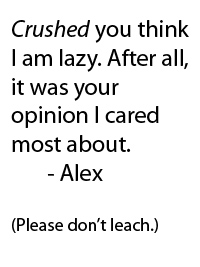Wikipedia: Beat It, Join It, or Ignore It?
Chronicle of Higher Education (subscription) - 2 hours ago
Wikipedia does not have a lot of credibility within academe, and detractors of the online, open-source encyclopedia say it devalues the notion of expertise ...
This is from a related article by the feller who's leading this live discussion. He apparently made 13 false edits to WP a couple of years ago and they were all reverted fairly quickly:
I wonder if he used different IP addresses or user accounts for those edits? And does he know that once one edit is fact-checked and turns out to be false, the checker will usually just go through the user/IP's recent edits specifically, looking for a pattern, and insta-revert all the other edits as a matter of course?
I doubt it!
QUOTE
Mr. Halavais expected some of his fabrications to languish online for some time. Like many academics, he was skeptical about a mob-edited publication that called itself an authoritative encyclopedia. But less than three hours after he posted them, all of his false facts had been deleted, thanks to the vigilance of Wikipedia editors who regularly check a page on the Web site that displays recently updated entries.
I wonder if he used different IP addresses or user accounts for those edits? And does he know that once one edit is fact-checked and turns out to be false, the checker will usually just go through the user/IP's recent edits specifically, looking for a pattern, and insta-revert all the other edits as a matter of course?
I doubt it!
More info:
The issue of Chronical of Higher Education in which this appears (dated Oct. 27) should be on its way to subscribers by now, if not already in their hands. It's two articles in the same issue - the first is the main one, the second is background material:
http://chronicle.com/free/v53/i10/10a03101.htm
http://chronicle.com/free/v53/i10/10a03301.htm
Hard to say, but it looks like it might be a cover story. It's mostly pro-WP, in my opinion, though not completely. Here's what it has to say about the Nature study, for example:
Is he trying to be "fair and balanced," or is this a value judgement?
The issue of Chronical of Higher Education in which this appears (dated Oct. 27) should be on its way to subscribers by now, if not already in their hands. It's two articles in the same issue - the first is the main one, the second is background material:
http://chronicle.com/free/v53/i10/10a03101.htm
http://chronicle.com/free/v53/i10/10a03301.htm
Hard to say, but it looks like it might be a cover story. It's mostly pro-WP, in my opinion, though not completely. Here's what it has to say about the Nature study, for example:
QUOTE
Britannica editors were quick to assail the study: The test, they argued in a lengthy rebuttal on the encyclopedia's Web site, "was so poorly carried out and its findings so error-laden that it was completely without merit." Still, the report caused some scholars to rethink their skepticism about Wikipedia, says Mr. Halavais.
Is he trying to be "fair and balanced," or is this a value judgement?
Can Wikipedia Ever Make the Grade?
Chronicle of Higher Education (subscription) - 1 hour ago
Colloquy: Talk online with Alexander Halavais, a communications scholar who tested Wikipedia by deliberately introducing errors, about what the site's rising ...
Dude didn't answer my question!
Typical...
Nevertheless, it's an interesting Q&A session, though I personally don't see what the point is of vandalizing WP as part of an academic study. We all know that the survival rate of inaccuracies is extremely variable... Trying to come up with statistically-useful numbers on it (I assume that's what they're after) is a waste of time, in my opinion.
Here's a photo of Halavais, just so everyone can see what a lazy academic looks like. He's the one on the left.

Typical...
Nevertheless, it's an interesting Q&A session, though I personally don't see what the point is of vandalizing WP as part of an academic study. We all know that the survival rate of inaccuracies is extremely variable... Trying to come up with statistically-useful numbers on it (I assume that's what they're after) is a waste of time, in my opinion.
Here's a photo of Halavais, just so everyone can see what a lazy academic looks like. He's the one on the left.

We all know that the survival rate of inaccuracies is extremely variable... Trying to come up with statistically-useful numbers on it (I assume that's what they're after) is a waste of time, in my opinion.
It would need a properly designed study, and quite a large one if the survival rate is highly variable. I could design one quite quickly - if they paid well ...

Alexander M.C. Halavais, assistant professor of communications at Quinnipiac University, has spent hours and hours going through Wikipedia, which has become the Internet's hottest information source.
http://disembedded.newsvine.com/_news/2006...-make-the-grade
http://disembedded.newsvine.com/_news/2006...-make-the-grade
This is a "lo-fi" version of our main content. To view the full version with more information, formatting and images, please click here.
